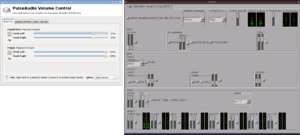Lennart Poettering
Lennart Poettering is one of the most influential, controversial and famous software developers in the free software community. He has created many of the basic building blocks which make up the fundamentals of modern Linux distributions including PulseAudio, systemd, systemd-homed and avahi. Many of these brought large changes that were controversial and outright hated by many when they were introduced yet they are regarded as standard features of any modern Linux distribution. Poettering is currently employed by IBM's subsidiary Red Hat.
systemd presentation at NULUG, 2018
Lennart Poettering at NYLUG, May 23rd, 2018.
Creations
The vast majority of modern distributions and applications use PulseAudio for audio management. It allows per-application volume controls, moving audio from one application to another on the fly, easy Bluetooth audio management and more.
systemd, which originally replaced the traditional init system, has become a fully featured service management system. The vast majority of Linux distributions use it for service management. systemd has many optional components for a variety of tasks including time syncronization, DNS management, logging and more.
The Avahi mDNS/DNS-SD was long used to provide zeroconf DNS management on most Linux distributions. It is still widely used. systemd-resolved, also by Poettering, can be used for most of Avahi's functionality.
Quotes
"What I just realized: if a tar archive ends in 1K of zeroes, it's considered the end of the archive, and everything after that is simply ignored (unless you specify --ignore-zeros, which, well, nobody specifies). This is so perfect for hash collision attacks! Love it!"
August 4th, 2020
So Much Drama
Lennart Poettering is not only one of the most influential Linux developers, he is also one of the most controversial.
Much of the hate against Poettering is simply based on differing opinions. There are, however, a some valid criticism based on very valid technical arguments. Poettering is openly against the Unix philosophy of making small programs that do one thing well. He as also openly argued against POSIX. Further, he's claimed that BSD, which arguably has much better security than any of his software will ever have, "is not relevant anymore"[1]. In the above 2018 NULUG video he explains how the vast majority of machines run Linux whereas BSD, Solaris, UNIX and such have only a tiny installed base. This was different in 1975 but this is the 21st century.
systemd is one huge monolithic program which goes against the Unix philosophy. However, it must be noted that while systemd is huge it is actually many small separate programs developed under the same umbrella. systemd-timesyncd and systemd-homed are developed as a part of systemd but they are in no way mandatory parts of systemd. Most systemd utilities are optional.
PulseAudio controversies
Poettering got a lot of hate for creating and pushing PulseAudio the first half-dozen years of it's existence. Some of it was unfounded but a lot of it was totally justified. PulseAudio was very CPU demanding, relative to the hardware which was common at the time, when it was released in 2004. It would use a large amount of CPU power just to play audio. Using ALSA directly did not. Further, PulseAudio had a bad tendency to go into a spin and use 100% CPU when no audio was playing for years after its release.
PulseAudio didn't actually work right with SPDIF, specially when trying use pass-through, until SPDIF was obsolete and replaced by HDMI.
PulseAudio was released in 2004 and it wasn't really usable until 2012-2014. It has since become a standard part of the Linux audio stack and the modern version is fine. The benefits of using PulseAudio over plain ALSA on modern computers are huge. Per application volume control, the ability to easily move audio streams between devices and computers and other features PusleAudio brings to the table make it an essential part of any modern Linux distribution. The historic reasons people have, validly, criticized PulseAudio for are no longer relevant.
The CCC incident
Lennart Poettering did in fact walk up on stage with a beer in hand while someone was doing a presentation which criticized some of the software written by Poettering at the 27th Chaos Communication Congress in 2010. While there is no defense for this behavior it is something that happened long ago when Poettering was young. He has probably (hopefully) grown up since then.
Modern Linux with and without Poettering
Many of the features modern Linux distributions have are created by Lennart Poettering.
The audio management PulseAudio has is probably something every single Linux user enjoys on a daily basis, though even now Pipewire aims to replace it entirely, potentially rendering this contribution outmoded.
More corner-case features enabled by Poettering are probably used om a semi-regular basis. You can, for example, reboot directly into your machines EFI BIOS with a simple systemctl command:
systemctl --firmware-setup reboot
systemd has also made Linux boot times shorter and it provides tools which makes it possible to manually make boot times even shorter. The command
systemd-analyze blame
will let you see what system services are started at boot time so you can disable those who are neither required or desired.
The list of benefits his software provides to every day Linux users is much longer than this, though.



Enable comment auto-refresher